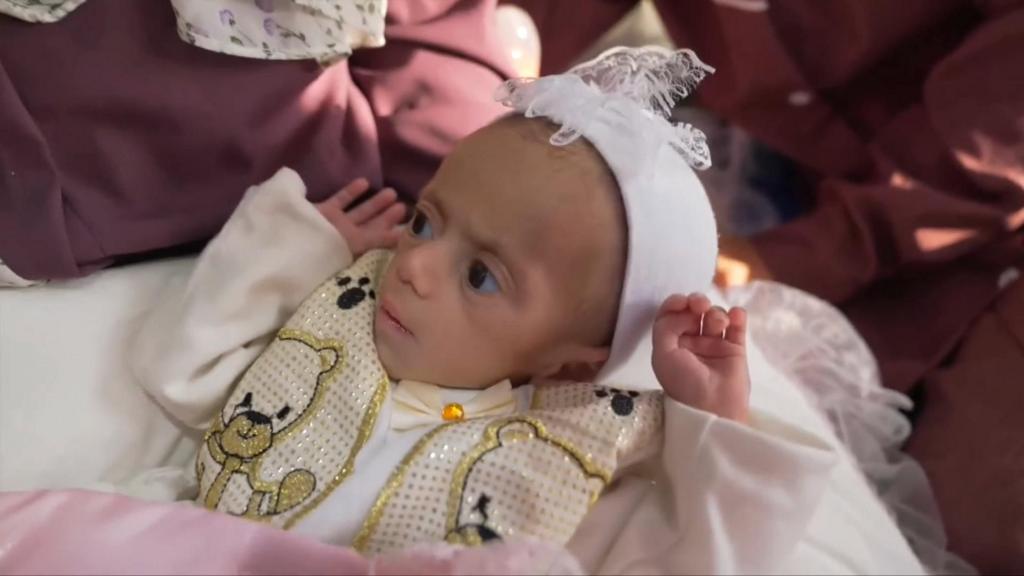Six-month-old Siwar Ashour’s faint cries were audible even before she was carried from the bus. Her voice, a testament to resilience, belonged to a child born into war, now temporarily escaping its grasp.
Siwar, smaller than photos suggest, weighing a mere 3kg (6.6lb), should weigh double. Her mother, 23-year-old Najwa, smiled, describing the feelings of crossing into Jordan on Wednesday with her daughter and other evacuated Palestinian children. The first thing she noticed was the silence.
“It feels like a truce,” she said. “We’ll spend the night without rockets and bombs, God willing.”
Siwar was accompanied by her grandmother, Reem, and her blind father, Saleh.
“This trip’s sole purpose is Siwar’s safety and treatment,” Saleh stated. “She’s my daughter, my blood, and I’m deeply worried about her.”
Reem carried Siwar off the bus, forming a V for victory—a symbol of hope for Siwar’s future.
“I still can’t believe we’re in Jordan. Seeing King Abdullah’s photo at the border filled me with joy. I made the victory sign…for Siwar.”
In April, the BBC reported on Siwar at Nasser hospital in Gaza, where malnutrition, due to a shortage of specialized formula, was diagnosed. Her body was severely emaciated; Najwa was unable to breastfeed due to her own malnutrition.
Formula was subsequently provided by the Jordanian Field Hospital and private donors. However, the Israeli blockade, partially eased three weeks prior, and escalating conflict made it clear Siwar needed comprehensive care.
A February agreement between King Abdullah and President Trump saw Jordan offer treatment to 2,000 seriously ill children in Amman.
Gaza’s overwhelmed medical system struggles with the influx of sick and wounded. Since March, 57 children and 113 escorts have been evacuated; sixteen, including Siwar, arrived on Wednesday.
Cradled by her grandmother, Siwar gazed at the border’s unfamiliar crowd. She was taken to a climate-controlled hall where Jordanian medics provided food and drinks—a stark contrast to her reality.
The parents’ and children’s exhaustion was palpable. This evacuation highlighted a shared trauma—displacement, food shortages, and the ever-present threat of violence.
These families endure repeated displacement due to Israeli evacuation orders or prolonged searches for food. Death or loss is a common experience among their friends and relatives.
Families are frequently separated. Najwa took Siwar to the hospital, marking a two-month separation from Saleh.
“I thought it would be a short stay,” Saleh recalled. “But it dragged on… I realized her condition was very serious.”
We traveled to Amman with Siwar and her family. Najwa slept deeply; Siwar remained awake. The ambulance also carried two cancer-stricken boys, their mothers, and younger siblings. One four-year-old cried incessantly from exhaustion and fear.
In Amman, Siwar was transferred to a nurse and another ambulance. She will receive essential testing and treatment impossible in Gaza. Her family will finally sleep without fear.
With additional reporting by Alice Doyard, Suha Kawar, Matthew Goddard and Malaak Hassouneh.
Their boat had been intercepted as they attempted to break Israel’s naval blockade on Gaza and deliver a symbolic amount of aid.
Asif William Rahman used top security clearance to print and circulate documents over several months.
At least 39 reportedly die in three incidents near lorries transporting flour and aid distribution sites.
The Columbia University graduate had a key role in student protests over Gaza. Trump said his arrest was the first of “many to come”.
One of the two hostages was Yair Yaakov, who was killed in the Hamas-led attack on 7 October 2023, Benjamin Netanyahu says.

